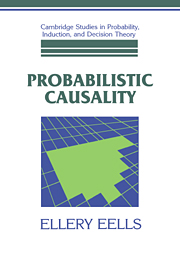Book contents
- Frontmatter
- Contents
- Preface
- Introduction
- Chapter 1 Populations and probability
- Chapter 2 Spurious correlation and probability increase
- Chapter 3 Causal interaction and probability increase
- Chapter 4 Causal intermediaries and transitivity
- Chapter 5 Temporal priority, asymmetry, and some comparisons
- Chapter 6 Token-level probabilistic causation
- Appendix 1 Logic
- Appendix 2 Probabilit
- Bibliography
- Index
- Frontmatter
- Contents
- Preface
- Introduction
- Chapter 1 Populations and probability
- Chapter 2 Spurious correlation and probability increase
- Chapter 3 Causal interaction and probability increase
- Chapter 4 Causal intermediaries and transitivity
- Chapter 5 Temporal priority, asymmetry, and some comparisons
- Chapter 6 Token-level probabilistic causation
- Appendix 1 Logic
- Appendix 2 Probabilit
- Bibliography
- Index
Summary
My interest in probabilistic causality arose naturally from my earlier interest, as a graduate student and after, in the area of the philosophical foundations of decision theory. I was especially interested in the decision-theoretical puzzle known as Newcomb's paradox and the idea of causal decision theory (Eells 1982). Causal decision theory was designed to accommodate the fact that the evidential, or “average” probabilistic, significance of one factor or event for another need not coincide with the causal significance of the first factor or event for the other – a fact vividly illustrated by the Newcomb problem. Causal decision theory involves ideas and techniques quite similar to the ideas and techniques involved in untangling and understanding the relations between probabilistic and causal significance in the theory of probabilistic causality.
Most of the recent philosophical literature in this area has seemed to concentrate on what I call here type-level probabilistic causation, though some authors have either noted or developed theories of what I call here token-level probabilistic causation. The first five chapters of this book are about type-level probabilistic causation. The last, very long, chapter is on token-level probabilistic causation. It is probably Chapter 6, which gives a new theory of token-level probabilistic causation, that contains the most novel proposals of this book.
Information
- Type
- Chapter
- Information
- Probabilistic Causality , pp. ix - xiiPublisher: Cambridge University PressPrint publication year: 1991
